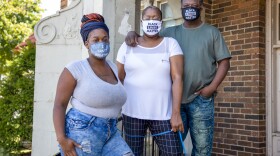Martha Bebinger
[Copyright 2024 NPR]
-
From heat-related illness to mosquito-borne infections, physicians are seeing the effects of a warming planet in the exam room. There's a growing push to teach doctors-in-training how to respond.
-
Health care is taking a bigger role in down-ballot races this fall, especially as the Supreme Court is set to hear another case that could determine the fate of the Affordable Care Act.
-
Few medical residents learn about the health effects of climate change. Now as wildfires sweep the West and hurricanes flood the Gulf Coast, the first published guidelines offer a way to start.
-
A survey of 17 cities found more than 50,000 pandemic-related eviction filings. Housing advocates worry that increased housing instability will lead to more COVID-19 and other illnesses.
-
More than 200,000 people in the U.S. have died of COVID-19. We hear from three areas of the country about how the pandemic has affected life there.
-
Doctors are researching why some patients remain unconscious for days or weeks, even after sedating drugs are withdrawn. They also worry that these patients aren't being given time to recover.
-
Doctors are studying a troubling development in some COVID-19 patients: They survive the ventilator, but don't wake up. The persistent, coma-like state can last for weeks.
-
The state offers support and resources for people isolating because of COVID-19 — helping them make choices that keep everyone safe. It's work more states need to fund, experts say.
-
Nationwide, coronavirus infection numbers are trending down, but several states are seeing upticks, with the heaviest impact falling on communities of color and nursing home residents.
-
Without a cure for COVID-19, doctors are desperately trying to figure out the best treatment regimen for patients. And what they're trying, may look very different depending on the hospital.





